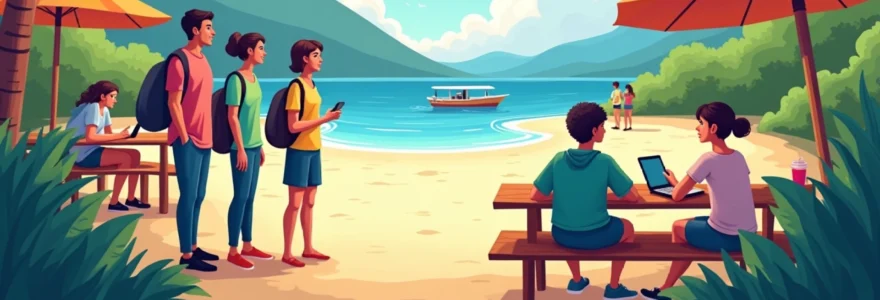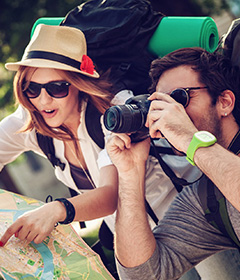Educational collective vacations are emerging as a powerful alternative to traditional classroom-based learning. These immersive experiences combine the excitement of travel with structured learning opportunities, offering students a unique way to engage with new cultures, languages, and academic subjects. As educators and parents seek innovative approaches to education, understanding how these group travel experiences stack up against conventional learning methods is crucial.
The concept of learning through travel is not new, but recent advancements in pedagogical frameworks and technology have transformed these experiences into sophisticated educational tools. By leveraging the natural curiosity that comes with exploring new environments, educational collective vacations tap into students’ intrinsic motivation to learn, often resulting in deeper and more lasting knowledge acquisition.
Pedagogical frameworks in collective educational travel
The success of educational collective vacations lies in their foundation of robust pedagogical frameworks. These frameworks are carefully designed to maximize learning outcomes while capitalizing on the unique opportunities presented by travel experiences. Unlike traditional classroom settings, where learning is often compartmentalized, collective educational travel integrates various disciplines in real-world contexts.
One of the primary advantages of these travel-based learning experiences is the ability to provide immediate application of knowledge. Students are not simply memorizing facts for a test; they are actively engaging with the material in authentic situations. This approach aligns closely with constructivist learning theories, which emphasize the importance of learners building their own understanding through experience and reflection.
Moreover, the social aspect of collective travel creates a fertile ground for collaborative learning. Students work together to navigate new environments, solve problems, and share insights, fostering a sense of community that enhances the learning process. This social dimension is often less pronounced in traditional classroom settings, where individual achievement is typically emphasized.
Experiential learning models in group vacations
Experiential learning is at the heart of educational collective vacations, providing a stark contrast to the often passive nature of traditional classroom instruction. These travel experiences are designed to engage students in all aspects of learning, from concrete experiences to abstract conceptualization.
Kolb’s experiential learning cycle applied to travel
David Kolb’s Experiential Learning Cycle is particularly relevant in the context of educational travel. This model posits that effective learning occurs through a cycle of concrete experience, reflective observation, abstract conceptualization, and active experimentation. In a travel setting, students naturally move through these stages as they encounter new situations, reflect on their experiences, form new ideas, and apply their learning to subsequent challenges.
For example, a student visiting a historical site might first experience the physical environment ( concrete experience ), then discuss their observations with peers ( reflective observation ). This could lead to a deeper understanding of historical events ( abstract conceptualization ), which they might then apply to interpreting other historical contexts ( active experimentation ).
Situated cognition theory in cultural immersion
Situated Cognition Theory suggests that knowledge is inseparable from the context in which it is learned. Educational collective vacations excel in this regard, providing rich, authentic contexts for learning. When students are immersed in a new culture, they’re not just learning about it; they’re experiencing it firsthand, which can lead to more profound and nuanced understanding.
This immersive approach is particularly effective for language learning. Students in a traditional classroom might struggle to grasp the nuances of a foreign language, but when immersed in a country where that language is spoken, they rapidly develop practical communication skills and cultural awareness.
Project-based learning through collaborative excursions
Project-based learning (PBL) is another pedagogical approach that finds a natural home in educational travel experiences. Collaborative excursions often involve group projects that require students to work together to solve real-world problems or create tangible outcomes. This approach contrasts sharply with the individual assignments typical of traditional classrooms.
For instance, a group of students might be tasked with creating a documentary about local environmental issues during their travel. This project would require them to research, interview locals, collaborate on filming and editing, and present their findings—all skills that are highly valued in modern workplaces.
Reflective practice techniques for travel experiences
Reflection is a critical component of experiential learning, and educational collective vacations often incorporate structured reflective practices. These might include guided journaling, group discussions, or multimedia presentations where students process and share their experiences.
By engaging in regular reflection, students deepen their understanding of what they’ve learned and how it relates to their prior knowledge and future goals. This metacognitive practice is often less emphasized in traditional learning environments, where the focus is frequently on content delivery rather than personal meaning-making.
Cognitive and social development in collective learning environments
Educational collective vacations offer unique opportunities for both cognitive and social development that are often challenging to replicate in traditional classroom settings. The dynamic nature of group travel creates an environment ripe for personal growth and skill acquisition.
Vygotsky’s zone of proximal development in group dynamics
Lev Vygotsky’s concept of the Zone of Proximal Development (ZPD) is particularly relevant in collective learning environments. The ZPD represents the difference between what a learner can do without help and what they can do with guidance and encouragement from a skilled partner. In group travel situations, students constantly operate within this zone as they support and challenge each other.
For example, a student who is hesitant to speak a foreign language might be encouraged and assisted by more confident peers, gradually expanding their capabilities. This peer-supported learning is a powerful aspect of collective educational travel that is often less pronounced in traditional classroom environments.
Peer-to-peer learning opportunities in shared travel experiences
Shared travel experiences create numerous opportunities for peer-to-peer learning, which can be more engaging and effective than traditional teacher-led instruction. Students naturally share knowledge, skills, and perspectives as they navigate new environments together. This horizontal transfer of knowledge often leads to unexpected learning outcomes and fosters a sense of collective achievement.
Moreover, the diverse backgrounds and interests of group members can lead to a rich exchange of ideas and experiences. A student with a passion for art history might offer insights during a museum visit, while another with strong language skills might help the group navigate local interactions. This organic sharing of expertise contributes to a well-rounded learning experience for all participants.
Cultural intelligence development through diverse group interactions
Educational collective vacations excel in developing cultural intelligence, a crucial skill in our increasingly globalized world. By interacting with diverse cultures and navigating unfamiliar social norms, students rapidly develop their ability to understand and adapt to different cultural contexts.
This immersive approach to cultural learning is far more effective than studying cultural differences in a classroom setting. Students learn to appreciate diversity, recognize their own cultural biases, and develop the flexibility needed to thrive in multicultural environments—skills that are increasingly valued by employers and essential for global citizenship.
Emotional intelligence enhancement in collective Problem-Solving
Group travel inevitably presents challenges that require collective problem-solving, from navigating transportation systems to resolving interpersonal conflicts. These situations provide excellent opportunities for enhancing emotional intelligence, as students must learn to manage their own emotions and respond empathetically to others under sometimes stressful conditions.
The development of emotional intelligence through these experiences can have far-reaching benefits, improving students’ ability to work in teams, lead effectively, and maintain positive relationships—skills that are often underdeveloped in traditional academic settings.
Curriculum integration and academic outcomes of educational travel
While the benefits of educational collective vacations are clear in terms of personal development and soft skills, their impact on academic outcomes is equally significant. Innovative educators are finding ways to integrate travel experiences into core curriculum areas, enhancing traditional learning objectives through real-world application.
For instance, a history curriculum might be brought to life through visits to significant historical sites, allowing students to connect textbook knowledge with tangible evidence. Science education can be enriched through field studies in diverse ecosystems, providing hands-on experience with concepts like biodiversity and environmental conservation.
Furthermore, the interdisciplinary nature of travel experiences naturally supports the trend towards integrated curricula. A single travel experience might touch on history, geography, language, art, and social studies, providing a holistic learning experience that helps students see connections between different subject areas.
Research has shown that students who participate in educational travel often demonstrate improved academic performance upon return. This improvement is attributed to increased engagement with learning, enhanced critical thinking skills, and a broader perspective on academic subjects. The challenge for educators is to effectively capture and build upon these gains within the traditional school environment.
Technology-enhanced learning in collective vacation contexts
The integration of technology has significantly enhanced the educational potential of collective vacations, bridging the gap between traditional and experiential learning methods. Digital tools are being used to augment real-world experiences, provide instant access to information, and facilitate collaborative learning across distances.
Mobile learning applications for On-the-Go education
Mobile learning applications have become essential tools for educational travel. These apps can provide just-in-time information about historical sites, cultural customs, or local flora and fauna, enriching the travel experience with instant access to relevant knowledge. Language learning apps, in particular, have revolutionized the way students engage with new languages during their travels.
For example, students might use a language app to practice key phrases before interacting with locals, or a cultural etiquette app to ensure they’re behaving appropriately in different social contexts. These tools provide a level of support and information access that was previously unavailable to travelers, enhancing the learning potential of every interaction.
Virtual reality integration for Pre-Trip cultural preparation
Virtual Reality (VR) technology is being used innovatively to prepare students for their travel experiences. Before departure, students can take virtual tours of destinations, familiarizing themselves with layouts of cities or museums. This pre-trip exposure can enhance the actual visit by allowing students to focus on deeper engagement rather than basic orientation.
VR can also be used to simulate cultural interactions, helping students practice language skills or cultural norms in a safe, controlled environment. This preparation can significantly reduce culture shock and increase students’ confidence in navigating new environments.
Collaborative digital platforms for group project management
Collaborative digital platforms have become invaluable for managing group projects during educational travel. These tools allow students to share resources, coordinate tasks, and collaborate on deliverables even when they’re not physically together. This capability extends the collaborative learning experience beyond the travel period itself, as students can continue to work together on projects after returning home.
For instance, a group might use a shared digital workspace to compile research notes, photos, and video footage collected during their trip, collaboratively creating a multimedia presentation of their learning experiences.
Augmented reality tools for enhanced site exploration
Augmented Reality (AR) applications are transforming the way students interact with historical sites and cultural artifacts. By overlaying digital information onto the real world, AR can provide context, historical recreations, or additional details that enrich the learning experience.
For example, an AR app might allow students to see a ruined ancient temple as it would have appeared in its prime, or provide interactive information about artifacts in a museum. This technology brings static sites to life, making history and culture more engaging and memorable for students.
Assessment and evaluation methodologies for Travel-Based learning
Assessing the outcomes of educational collective vacations requires a shift from traditional evaluation methods. While standardized tests might measure rote learning, they often fall short in capturing the complex, multifaceted learning that occurs during travel experiences.
Innovative assessment approaches for travel-based learning often include portfolio assessments, where students compile evidence of their learning through photographs, journals, and project outputs. Reflective essays or presentations allow students to articulate their personal growth and connect their experiences to academic concepts.
Peer and self-assessment also play a crucial role, as they encourage students to take ownership of their learning and develop critical evaluation skills. These assessments might include group debriefs, individual reflection sessions, or collaborative project evaluations.
Long-term impact assessments are particularly valuable for educational travel programs. These might track students’ academic performance, career choices, or global engagement over time, providing insights into the lasting effects of travel-based learning experiences.
Ultimately, the goal of assessment in educational travel contexts is not just to measure learning outcomes, but to enhance the learning process itself. Well-designed assessments can prompt deeper reflection, encourage students to make connections between their experiences and academic concepts, and help them articulate the value of their learning to others.


